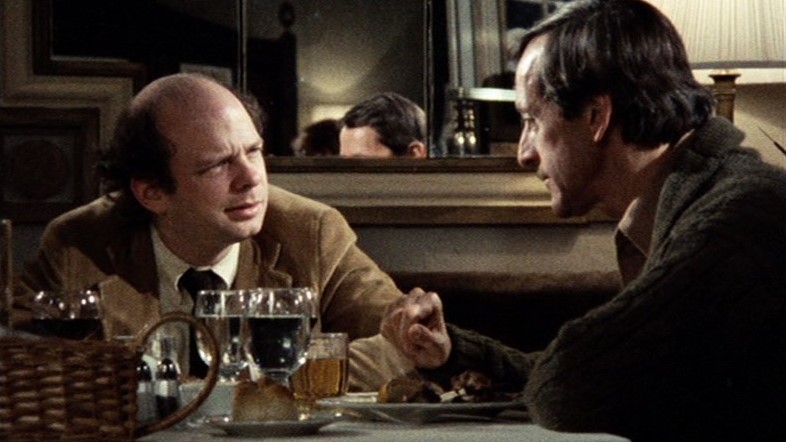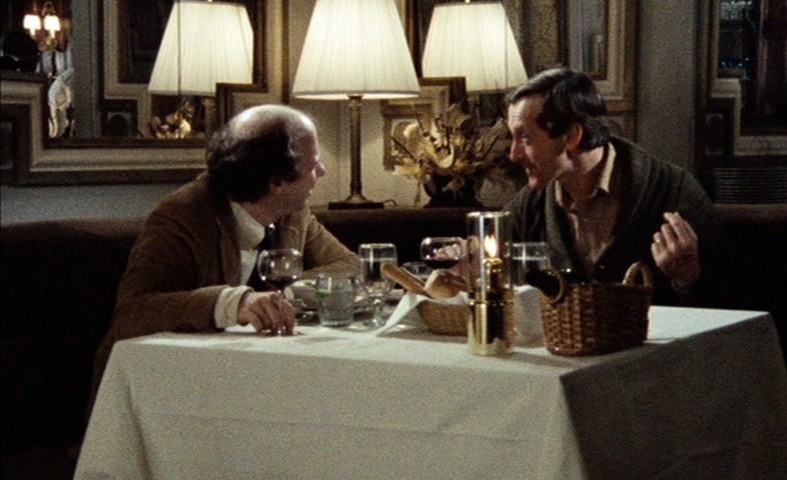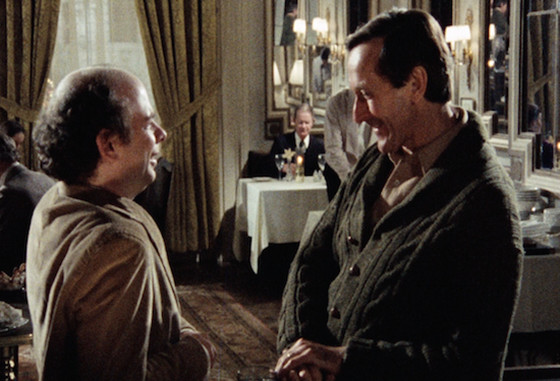
“We’re just going around all day like unconscious machines, and meanwhile there’s all this rage and worry and uneasiness just building up and building up inside us.”
– Wallace Shawn, My Dinner With André
All you can eat
A few summers ago, back in 2009, I hand picked some of my favourite films for a series of screenings at Cinevic in Victoria, BC. More than just an early evening screening series, I introduced the films, giving them a proper context along with some anecdotal remarks, and led a lively discussion afterwards. At the top of my list for the series was Louis Malle’s unlikely box office bang, 1981’s much-adored My Dinner with André.
For the purposes of my screening I made sure to personally invite a few folks who I knew specifically were more of the Jerry Bruckheimer/Michael Bay predilection when it came to spending a night at the cinema.
As I made my preface to the film I was sure to point out that while the title of the film accurately depicts its content it also deludes it, this is a film that, each time I’ve seen it, has never once failed to excite, animate, and arouse my imagination and my consciousness, and that, somehow, it manages to be more breathtaking, flashy, and precarious as a hundred Armageddons, Con Airs, or Transformers actioners could ever be.
When André ended the discussion afterwards was meteoric, emotional, and genuine. I couldn’t stop smiling, and nodding, and chiming in. A film that, on paper sounds so pretentious and contrived could resonate with such impetus and elation, even to a crowd mottled with sidewalk superintendents and slanderers.
“Just two people talking, shot mostly in close-up. But hammering against the wall of Shawn’s pragmatism, sometimes pulled up short in awareness of its own absurdity, Gregory’s account of his spiritual odyssey becomes a magical mystery tour of thoughts, dreams, fantasies and emotions. Riveting, exhilarating stuff.”
– Derek Adams, Time Out
Louis Malle (Murmur of the Heart, Pretty Baby) was a prevalent figure of the French New Wave, his films frequently smashed taboos, fearlessly taking anathema content and upending it. By 1981 Malle had been in America for a number of years, an expatriate, of sorts (he would later return to his native France for Au Revoir Les Enfants and Milou en Mai later that decade), he’d release two outstanding films that year, Atlantic City and also André.
My Dinner with André, as the title suggests, consists of two old chum New York intellectuals — uptight actor-playwright Wallace Shawn and outré avant-garde theatre director André Gregory, playing fictionalized simulacrum versions of one another — talking for 111 minutes over a three course meal and coffee.
It sounds mincing, doesn’t it? Showy, overblown, and masturbatory, surely in lesser hands, like, say, Kevin Smith, it might raise ire and umbrage, but that isn’t the case here, no, not at all. Their discussions on art, theatre, travel, love, the search for religious experience, holy moments, authenticity, and enlightenment is articulate, anodyne, frequently funny, cordial, and believably natural.
A great triumph for André is how its candid and crazed discussions come across as unplanned and ad-libbed (actually carefully scripted, workshopped, and rehearsed for months by Gregory and Shawn) while also casting the ignus fatuus of real-time, to boot.
“One of the gifts of My Dinner with André is that we share so many of the experiences. Although most of the movie literally consists of two men talking, here’s a strange thing: We do not spend the movie just passively listening to them talk. At first, director Louis Malle’s sedate series of images (close-ups, two-shots, reaction shots) calls attention to itself, but as Gregory continues to talk, the very simplicity of the visual style renders it invisible. And like the listeners at the feet of a master storyteller, we find ourselves visualizing what Gregory describes, until this film is as filled with visual images as a radio play—more filled, perhaps, than a conventional feature film.”
– Roger Ebert
Dinner and a movie

André opens with Shawn en route to a Manhattan restaurant to have dinner with Gregory, a formerly very close friend whom he hasn’t spent time with much less seen for a number of years. At first very apprehensive to re-connect, Shawn’s voiceover informs us of his reservations and restlessness.
Shawn has heard stories over the years they’ve been apart, stories of André dropping out, going on trips to Tibet without his wife and kids, joining bizarre ashrams, communing with trees, and other unorthodox behaviour that he himself would never entertain.
One recent encounter with a mutual friend had brought up an odd turn finding André weeping openly in the street, having just come out of Ingmar Bergman’s Autumn Sonata, moved by a line spoken by Charlotte (Ingrid Bergman’s character); “I could always live in my art, but never in my life.”
“Obviously something terrible had happened to André,” Shawn shakily concludes, “and the whole idea of meeting him made me very nervous… I couldn’t help André—was I supposed to be a doctor, or what?”
Before long Wallace is at an upscale eatery of André’s choosing and finds him to be interminably upbeat and altogether lovable and receptive.
André’s exploits in the Sahara, being buried alive as performance art, encounters with poetic, flower-tongued creatures, and other rattling undertakings is all heart and strangely simpatico. Wally nods, listens graciously, and often has knee-jerk rejoinders that are less and less uptight (except, maybe, for his artificial amenity for his electric blanket).
“At times My Dinner with André suggests a reunion of Christopher Robin (Mr. Gregory) and Winnie-the-Pooh (Mr. Shawn) thirty years after each has left the nursery to pursue separate careers in the theatre… And that, possibly, is the reason that this film is often so invigorating, and why these two men respond to each other so well.”
– Vincent Canby, New York Times
Nighthawks at the diner

Anyone who has had the great concession of making real human connection, who has stayed awake into the small hours, rapt in discussion, sharing repartee that tugs at the very heart of truth and beauty, can find amity and admiration for My Dinner with André. It’s a film that you ferry around for days afterwards, ideas and thoughts that haunt and hypnotize, that eddy and arc in the mind like a neon-lit bijou in the dead of darkest night.
Malle would magnificently reunite with Gregory and Shawn in 1993 for Vanya on 42nd Street, a charming riff on Anton Chekov channelled through David Mamet that frequently reiterates the André allure. It would be Malle’s last film (he passed away in 1995), though he did often remark that he wanted to do a third film with Gregory and Shawn, to make a sort of metaphysical triptych with these late career muses.
Certainly it is in this stouthearted state of mind that Jonathan Demme (The Silence of the Lambs, Rachel Getting Married) dedicates his latest film, A Master Builder (2014), to Malle. Demme’s film reunites the cast of André in a similar splashy fashion that Malle would ardently approved of.
After digesting and deliberating My Dinner with André, even, or perhaps especially after thirty plus years, André more than ever avows and embodies a man who, like us, doesn’t have all the answers, but yet he never stops bravely asking the questions that matter the most.
Author Bio: Shane Scott-Travis is a film critic, screenwriter, comic book author/illustrator and cineaste. Currently residing in Vancouver, Canada, Shane can often be found at the cinema, the dog park, or off in a corner someplace, paraphrasing Groucho Marx. Follow Shane on Twitter @ShaneScottravis.